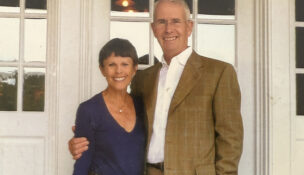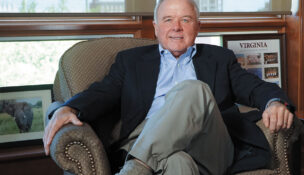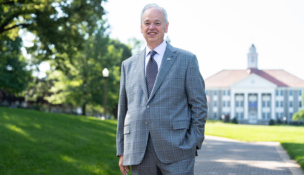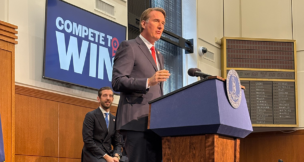An emphasis on problem solving
Programs are sought to groom a new generation of leaders.
An emphasis on problem solving
Programs are sought to groom a new generation of leaders.
Executive education 2000: Executives stand in a line to go into a classroom.
Executive education 2013: Executives go online, and the classroom comes to them.
More and more, executive education in all its forms — whether it’s an executive degree program or a nondegree course — has an online component baked in.
Roy Hinton, associate dean of executive programs at George Mason University’s School of Management, has seen it unfold.
He offers an example: “You used to come to class and go away to do your teamwork. Now, you do your assignments and watch your content [online] and come to class to do your teamwork.”
Even when the lessons are over and the executives finish up, the online follow-ups can continue as schools reach out to offer supplemental material or pitch new content and courses.
No one is diminishing the value of face time with professors and thought leaders in executive education, it’s just that “online” has become the Zeitgeist of the early 21st century.
Besides the ascent of online learning, Hinton says, a second trend, customized programs — “an old trend that is sustaining itself” — is regaining the momentum it lost during the dark days of the recession, when companies were cutting their budgets to the bone.
Now, as the economy grudgingly improves, companies are coming in with problems and partnering with executive education programs to help solve them.
Hinton points to a recent client, Oracle Direct, that wanted to improve retention of its high-sales management group. Too many high performers did not see the company as a career destination. Oracle Direct, a direct sales and technical service arm of the software giant Oracle Corp., wanted to change that but, first, it had to change its culture. “They wanted their employees to know that they were willing to invest in them,” Hinton says.
So, George Mason University tailored a program that had high standards for admission but offered Oracle employees meeting those standards an opportunity for top-level leadership, management development and, ultimately, promotion.
Hinton says the GMU’s partnership with Oracle produced a significant improvement in retention for the company and helped the School of Management establish what it hopes will be a long-term relationship with a valuable client.
Cost shifting
Maureen Hall, executive director of the Virginia Tech Executive MBA program in Arlington, says one of the trends she has noticed in executive education is that increasingly participants are bearing more of the financial burden.
At one time, companies were paying 75 to 100 percent of the costs, but today it’s more like 25 percent, and the recession hasn’t helped. “In a recession, the first thing that goes is education,” Hall says.
Despite a decline in company financial support for executive education participants, companies still are giving employees time off to upgrade their skills, particularly the basics. “They want them to know finance, marketing and accounting,” she says.
Erika James is the new senior associate dean for executive education at the University of Virginia’s Darden School of Business, overseeing custom and open-enrollment programs.
She notes that Darden, which has a national and international clientele, is employing the latest technology to complement its roster of professors in the executive education arena.
“We’re using telepresence more and more to pull in key executives and case protagonists into the classroom,” she says.
“Telepresence” is a collection of advanced technologies that permit someone in a remote location to feel as though the person addressing them is in the same room.
Sometimes, James says, the best way to bring in the speakers you want when you want them is to beam them in using teleconferencing.
Technology also is playing a larger role in assessing executive education participants. Even before program participants arrive, Darden is measuring them through online personal leadership surveys, which might include observations from supervisors and cohorts.
Lou Centini, senior director of executive education at Darden, says assessments and comments from others help provide a clearer picture of each student’s strengths and needs. “It’s about evaluating an individual’s leadership capabilities,” Centini says, and its gives Darden more information in creating an individualized path toward progress.
Work/life balance
The effort of women executives to balance work and life has been a hot topic over the past year, spurred in part by the publication of Sheryl Sandberg’s book, “Lean In: Women, Work, and the Will to Lead.”
Sandberg, the chief operating officer at Facebook, explains why women’s progress in leadership positions in government and industry stalled and offers ways that women can reach their potential.
The book has been popular and controversial, but James says the conversation about women in leadership roles is pertinent to executive education today. “More and more women are leading startups, and a growing segment of entrepreneurs are women,” she says, a development that makes them good candidates for executive education.
James hears male executives talk about the same problems that had long been considered “women’s issues.” “It used to be that work-life balance was only about women. Now, men have the same concerns,” she says.
Jean Gasen, executive director for the Center for Corporate Education at the Virginia Commonwealth University School of Business Foundation, says she has been getting requests for programs from growing companies hiring young employees. These companies tell her their new hires often need help with communication and basic management skills.
A generation well skilled in texting is often not as well skilled in communicating orally and making presentations, she explains. “We can help with that,” Gasen says.
A return on investment
Across town at the University of Richmond’s Robins School of Business, Senior Associate Dean Richard Coughlan says companies are more insistent on seeing a return on their investment in executive education, particularly in more expensive customized programs. “There’s a much higher expectation that progress will be made in solving problems,” Coughlan says.
In some cases, he says, the problems that companies bring to the table require a response that resembles consulting more than training.
The UR dean also has seen a sharp rise in the number of nonprofits sending in managers and officers for executive training. He cites a “recognition among nonprofits that business acumen is required for survival — they probably didn’t hire for that.”
Larry “Chip” Filer, associate dean for executive programs at Old Dominion University’s College of Business and Public Administration, has concerns about the effect of sequestration on his programs, which draw heavily from the military-centric Hampton Roads area.
He’s not worried about degree-oriented programs, because the GI Bill has remained intact for tuition reimbursement in those areas. But, he notes, noncredit programs that don’t lead to a degree come out of a separate pot of money that has been affected by federal budget cuts.
“We are not that concerned about our MBA enrollment,” Filer says, “but we’re definitely concerned about our government contracting program.”
As baby boomers retire, Filer says, he’s fielding more requests from companies that want training in leadership and change management for employees who are moving up the ladder. “They’re technically proficient, but may have never had a chance to manage people,” he says.
Tapping retired talent
The Mason School of Business at the College of William & Mary says its executive education program has a treasure trove of talent that might be unequaled at other institutions.
That would be the school’s “executive partners,” a group of 125 recently retired C-Suite executives who live in Williamsburg and volunteer their time and expertise to the school of business. “We’ve got CEOs, CFOs, COOs,” says Deborah Hewitt, assistant dean for MBA programs.
The Mason School recently hosted a Southern regional conference for executive programs from about 30 colleges and universities. All of the schools were talking about a renewed focus on leadership skills. “There’s a good reason for that,” Hewitt says. “As things become more complex, leadership becomes more difficult.”
The corps of executive partners have walked that walk, she says, and their experiences — successes and failures — offer an unmatched reservoir of advice and counsel for executive education students and faculty alike.
The pitch to get the retired executives to sign up is not the kind of job description most HR departments would endorse. It focuses on hard work, interaction with students and faculty, a place other than the golf course to report to and an opportunity to guide the next generation of business leaders.
The downside: they don’t get paid, and they have to find their own parking. So far, recruitment has not proved to be a problem.
-
















